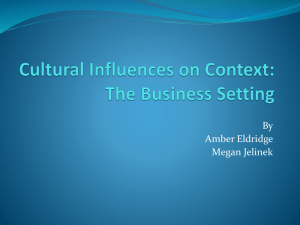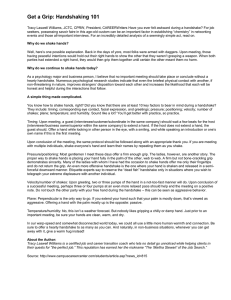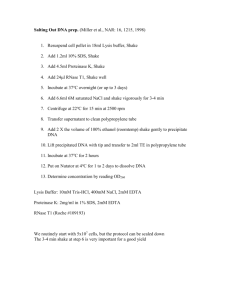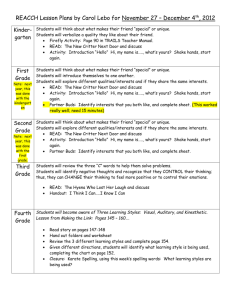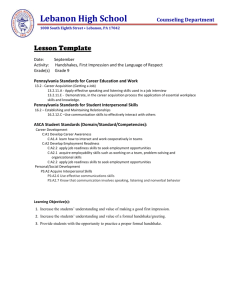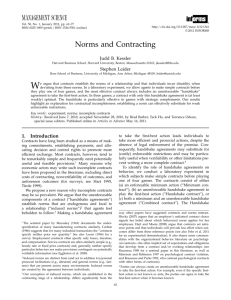Business Etiquette Quiz: Test Your Knowledge
advertisement
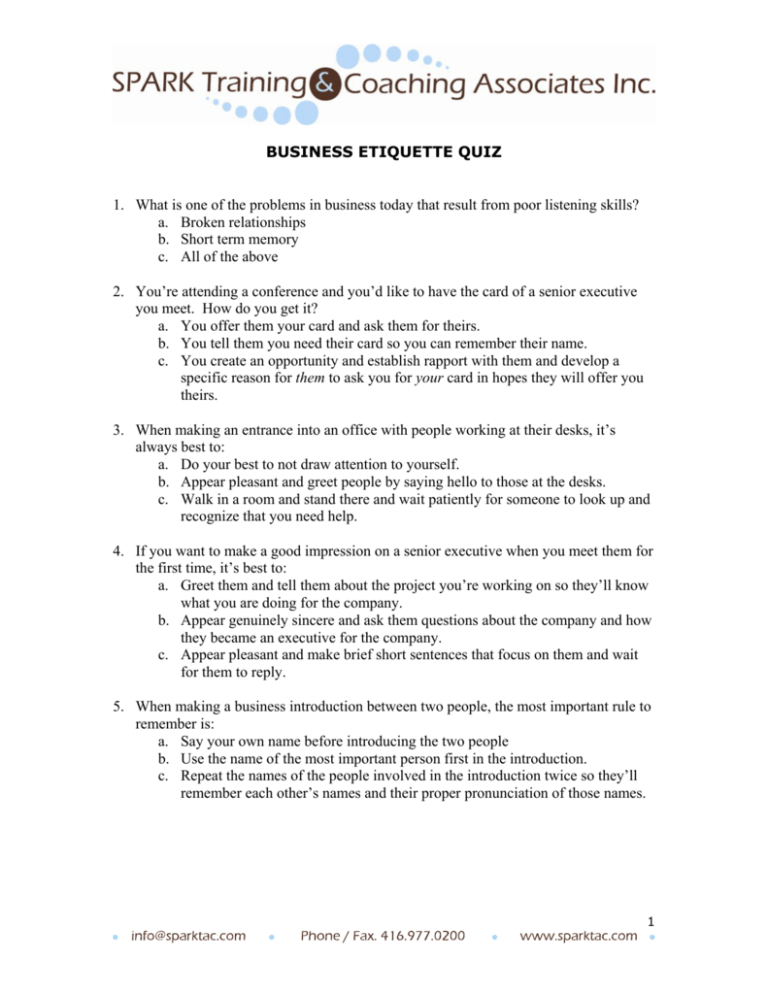
BUSINESS ETIQUETTE QUIZ 1. What is one of the problems in business today that result from poor listening skills? a. Broken relationships b. Short term memory c. All of the above 2. You’re attending a conference and you’d like to have the card of a senior executive you meet. How do you get it? a. You offer them your card and ask them for theirs. b. You tell them you need their card so you can remember their name. c. You create an opportunity and establish rapport with them and develop a specific reason for them to ask you for your card in hopes they will offer you theirs. 3. When making an entrance into an office with people working at their desks, it’s always best to: a. Do your best to not draw attention to yourself. b. Appear pleasant and greet people by saying hello to those at the desks. c. Walk in a room and stand there and wait patiently for someone to look up and recognize that you need help. 4. If you want to make a good impression on a senior executive when you meet them for the first time, it’s best to: a. Greet them and tell them about the project you’re working on so they’ll know what you are doing for the company. b. Appear genuinely sincere and ask them questions about the company and how they became an executive for the company. c. Appear pleasant and make brief short sentences that focus on them and wait for them to reply. 5. When making a business introduction between two people, the most important rule to remember is: a. Say your own name before introducing the two people b. Use the name of the most important person first in the introduction. c. Repeat the names of the people involved in the introduction twice so they’ll remember each other’s names and their proper pronunciation of those names. 1 6. For leading a successful business meeting, your number one priority is: a. Making sure you have good attendance and participation. b. Keeping great notes and sending them to everyone after the meeting. c. Creating tasks and accomplishing the agenda in the allotted time. 7. When giving a compliment, it’s best to: a. Give a compliment to someone so that many people can hear the praise you are giving them. b. Give compliments to everyone in the office so everyone receives regular praise. c. Compliment specific behaviours regarding work, avoid personal compliments. 8. Regarding criticism in the workplace, remember to: a. Give criticism privately so it won’t embarrass anyone. b. Criticize only a person’s work related skills and avoid offering personal criticism. c. Offer a patient critique and never criticize anyone. 9. Humour in the workplace is: a. A great way to occasionally break the stress during a business day. b. A way to show your character by demonstrating the areas you find humorous. c. All of the above. 10. Anger is a complex emotion that occasionally surfaces in the workplace. When it does, the best way to deal with anger is to: a. Train yourself to deal with anger and don’t express it during working hours. b. Speak your mind regularly so it doesn’t build up. c. Find outlets for your anger such as a walk during lunch, journaling, counting to ten. If you can’t resolve your anger, get help. 11. Office gossip destroys careers, however, if you’re only listening to gossip: a. You are not guilty of gossiping, after all, you were just listening and not passing it on. b. You have a deeper understanding of the complex problems of your associations and can offer help when necessary. c. You’re just as guilty as the one who is telling you gossip. 2 12. If you walk into the office of a person you do not know, do you offer to shake their hand? a. Yes. It’s important to be a gracious guest when entering someone’s office. b. No. You enter their office slowly (with a pleasant expression on your face) and wait for them to offer to shake your hand; only then do you extend your hand for a handshake. c. You introduce yourself first, and then you initiate a handshake with them. 13. If you are seated and someone approaches and offers to shake your hand, you should: a) Stand up and shake the person’s hand. b) Raise yourself slightly from your chair and shake the person’s hand. c) Dismiss the handshake as an unnecessary formality and motion for the person to sit down and join you. 14. If you are considered a junior officer in your company and approach a senior officer, do you offer to shake hands? a) Yes, it is an excellent opportunity to make create trust and rapport. b) No. You wait for the senior officer to initiate the handshake. c) You should only initiate the handshake if the other person is a man. Woman must be allowed to initiate handshakes according to their preferences. 15. When dealing with corporate politics, it’s usually best to: a. Let people know where you stand on issues, so you can work toward what it is that you believe. b. Create relationships with people who will side with you to create a corporate consensus against those who don’t agree with you. c. Respect all people’s opinions and treat everyone fairly to help make the best decision for the success of the company. 16. Making small talk is vital for conducting business today because it: a. Gives people an insight into your character. b. Creates rapport with people and lets them know you’re human. c. All of the above. 17. If you are running late for an appointment because your boss has called a last minute meeting, it’s best to: a. Call immediately and reschedule the meeting for a later time or another day. b. Try and go to both meetings even if you leave one early and arrive late for the other one. c. Call and let the person’s administrative assistant know you’ll be an hour late for your scheduled meeting. 3 18. When you’ve been left in a waiting room for someone to come and collect you and take you to their office: a. Use that time to look over the reports you’ve brought with you to give to them. b. Use the time to relax and return calls or check your voice mail messages. c. Do nothing except wait expectantly for the person to come and collect you. 19. Once you are in someone’s personal office, you can create a level of rapport by: a. Asking them questions about their specific job function for their company. b. Tell them about your specific job function within your company. c. Make comments about the building, facility or some aspect of their office. 20. When you are a guest in someone’s office, it is best to: a. Stay long enough so they can get to know you before you begin talking about business so they’ll learn to trust you. b. Be brief. Offer them leave-behinds. Follow up when you say you will. c. Answer questions you know they’ll ask (before they ask them) and provide them with a full educational opportunity about your product or service. 21. Someone in your office uses a wheelchair. When speaking to them, you: a. Sit down so that you are at eye level with them so they won’t strain their neck. b. Offer to push their chair every time you see them as an act of courtesy. c. All of the above. 22. If you know that an individual operates on an auditory channel and you want to let them know about an upcoming meeting, what would you say to them? a. “If you look closely, I think you’ll see the meeting is in the Oak Room.” b. “I hear the meeting’s in the Oak Room. I’ve heard it has great acoustics.” c. I’m so glad it’s in the Oak Room. I love the woodwork there.” 23. If an important call comes in when you are at a business lunch: a. Take the call at the table and try to be quiet so you won’t disturb the other diners during the call. b. Turn your phone off completely and collect your voice mail messages afterward. c. Tell your associates at lunch that you’re expecting an important call, put your phone on vibrate mode and when the call does come, excuse yourself, leave the table and go to a place where no one can hear you. When you return to the table, thank your guest for allowing you to take the call and don’t apologize or talk about the nature of the call. 4 24. To master the art of networking: a. Always take plenty of information with you about your product or service to take advantage of making a good sale or a promising business connection. b. Take cards and talk to people with whom you might develop a meaningful and mutually beneficial relationship over time and who might eventually buy or refer your company’s product or services. c. Gather as many cards as possible and when you get back to the office; send them all a formal business letter along with your company’s collateral material related to your product or service. Follow up with a phone call in two weeks time. Etiquette Quiz Answers 1. c, 2. c, 3. a, 4. c, 5. b, 6. c, 7. c, 8. c, 9. c, 10. c, 11.c, 12. b, 13. a, 14. b, 15. c, 16. c, 17. a, 18. c. 19. c, 20. b, 21. a. 22. b. 23. c. 24. b. 5
